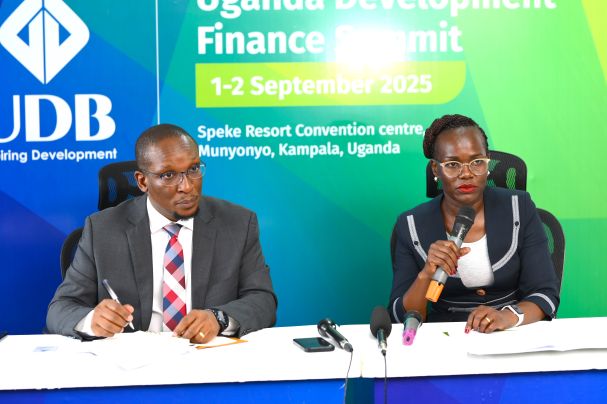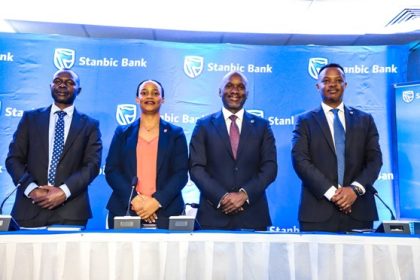UDB to lead charge for homegrown development finance solutions as Uganda hosts inaugural Africa summit
 UDB-Managing-Director-Dr.-Patricia-Ojangole-R-and-Director-Strategy-and-Corporate-Affairs-Joshua-Mwesiga-L-during-the-press-launch-of-the-Summit
UDB-Managing-Director-Dr.-Patricia-Ojangole-R-and-Director-Strategy-and-Corporate-Affairs-Joshua-Mwesiga-L-during-the-press-launch-of-the-Summit
Uganda is set to take centre stage in Africa’s development finance discourse as the Uganda Development Bank (UDB), in partnership with the Ministry of Finance, prepares to host the inaugural Uganda Development Finance Summit. The high-level event will take place from September 1 to 2, 2025, at the Speke Resort Convention Centre in Kampala.
Held under the theme “Transforming Africa through National Development Finance Architecture,” the summit is expected to convene more than 400 participants from across the continent. These will include senior government officials, leaders of national financial institutions, private sector executives, academics, and global development finance practitioners.
The summit comes at a critical moment, as African economies confront the dual pressures of dwindling concessional aid and increasingly costly access to global capital markets. In response, the continent is urgently exploring new, sustainable financing models to drive economic transformation from within.
Positioning UDB at the forefront of this search for homegrown solutions, the summit will provide a platform for dialogue, collaboration, and innovation. Speaking during the media launch of the event, UDB Managing Director Dr. Patricia Ojangole said the gathering aims to foster inclusive growth, support sustainable development initiatives, and confront the evolving challenges faced by national development banks across Africa.
“Hosting the Development Finance Summit reflects UDB’s commitment to championing a pan-African development finance agenda grounded in our local contexts and realities,” Dr. Ojangole said. “We need pragmatic, scalable solutions that will accelerate transformation and build economic resilience across our nations.”
The two-day programme will feature discussions on how development finance institutions can play catalytic roles in implementing industrial policy, strengthening agricultural value chains, and supporting the growth of small and medium enterprises (SMEs). Other sessions will examine the constraints and opportunities in green financing, and the role of blended finance in unlocking long-term investment for infrastructure, innovation, and climate-smart development.
The summit also underscores the urgent need for African countries to build strong domestic financial ecosystems. Organisers say that creating systems capable of mobilising local capital is essential to reduce exposure to volatile international markets and ensure development finance is tailored to national priorities.
With development banks increasingly expected to go beyond traditional lending functions, the Kampala summit is seen as a timely intervention—bringing together thought leaders and practitioners to shape policy, forge partnerships, and set a new course for Africa’s financing future.


 Government reaffirms commitment to capitalise UDB as Bank deepens development finance role
Government reaffirms commitment to capitalise UDB as Bank deepens development finance role
 Uganda’s DEI Biopharma gene therapy breakthrough could transform sickle cell treatment
Uganda’s DEI Biopharma gene therapy breakthrough could transform sickle cell treatment
 Equity Bank Uganda set to close 2025 on firmer footing as clean-up phase gives way to growth
Equity Bank Uganda set to close 2025 on firmer footing as clean-up phase gives way to growth
 Stanbic targets wider access to affordable financing with ‘Oli In Charge’ campaign
Stanbic targets wider access to affordable financing with ‘Oli In Charge’ campaign
 USA–Canada certification dispute could expose Uganda and regional airlines to regulatory risk
USA–Canada certification dispute could expose Uganda and regional airlines to regulatory risk
 Sumsub launches AI Agent Verification as Africa grapples with surge in AI-driven fraud
Sumsub launches AI Agent Verification as Africa grapples with surge in AI-driven fraud